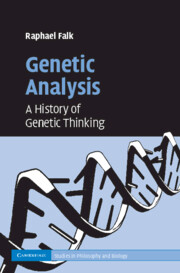Book contents
- Frontmatter
- Contents
- List of figures
- Acknowledgments
- Introduction
- PART I FROM REPRODUCTION AND GENERATION TO HEREDITY
- PART II FAKTOREN IN SEARCH OF MEANING
- PART III THE CHROMOSOME THEORY OF INHERITANCE
- PART IV GENES AS THE ATOMS OF HEREDITY
- PART V INCREASING RESOLVING POWER
- PART VI DEDUCING GENES FROM TRAITS, INDUCING TRAITS FROM GENES
- PART VII WHAT IS TRUE FOR E. COLI IS NOT TRUE FOR THE ELEPHANT
- 17 Extending hybridization to molecules
- 18 Overcoming the dogma
- 19 Dominance
- 20 Populations evolve, organisms develop
- Concluding comments
- Bibliography
- Index
18 - Overcoming the dogma
Published online by Cambridge University Press: 07 August 2009
- Frontmatter
- Contents
- List of figures
- Acknowledgments
- Introduction
- PART I FROM REPRODUCTION AND GENERATION TO HEREDITY
- PART II FAKTOREN IN SEARCH OF MEANING
- PART III THE CHROMOSOME THEORY OF INHERITANCE
- PART IV GENES AS THE ATOMS OF HEREDITY
- PART V INCREASING RESOLVING POWER
- PART VI DEDUCING GENES FROM TRAITS, INDUCING TRAITS FROM GENES
- PART VII WHAT IS TRUE FOR E. COLI IS NOT TRUE FOR THE ELEPHANT
- 17 Extending hybridization to molecules
- 18 Overcoming the dogma
- 19 Dominance
- 20 Populations evolve, organisms develop
- Concluding comments
- Bibliography
- Index
Summary
In December 1992 Bertil Daneholt presented the Nobel laureates in physiology and medicine for that year to the assembly of the Karolinska Institute in Stockholm:
In the middle of the last century, the Austrian monk Gregor Mendel conducted his famous breeding experiments with the garden pea. … To Mendel a gene was an abstract concept, which he used to interpret his breeding experiments. He had no idea of the physical properties of genes.
Only in the mid-1940s could it be established that in terms of chemistry, genetic material is composed of the nucleic acid DNA. About ten years later the double helical structure of DNA was revealed. Ever since then, progress within the field of molecular biology has been very rapid …
Initially, genetic material was studied mainly in simple organisms, particularly in bacteria and bacterial viruses. It was shown that a gene occurs in the form of a single continuous segment of the long, thread-like DNA, and it was generally assumed that the genes in all organisms looked this way. Therefore, it was a scientific sensation when this year's Nobel Laureates, Richard Roberts and Phillip Sharp, in 1977, independently of each other, observed that a gene in higher organisms could be present in the genetic material as several distinct and separate segments. Such a gene resembles a mosaic.… It soon became apparent that most genes in higher organisms, including ourselves, exhibited this mosaic structure. …
- Type
- Chapter
- Information
- Genetic AnalysisA History of Genetic Thinking, pp. 259 - 267Publisher: Cambridge University PressPrint publication year: 2009



